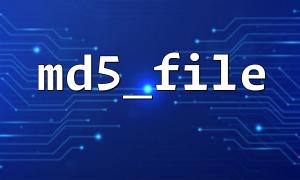In PHP development, the md5_file() function is a very useful tool for quickly calculating the MD5 hash value of a file. However, developers may encounter some unexpected issues when deploying or debugging PHP applications using md5_file() across different operating system environments, such as Windows, Linux, and macOS. Understanding these differences is crucial for ensuring the stability and consistency of the program.
Different operating systems use different path separators:
Windows uses the backslash (\)
Linux and macOS use the forward slash (/)
Although PHP internally handles some compatibility, when using md5_file() to process dynamically constructed paths, it is still recommended to use DIRECTORY_SEPARATOR or realpath() for consistent path handling. For example:
$path = __DIR__ . DIRECTORY_SEPARATOR . 'data' . DIRECTORY_SEPARATOR . 'file.txt';
echo md5_file($path);
Text files may have different encodings and line endings across systems (Windows uses \r\n, Linux uses \n). This can directly impact the result of md5_file(). Even if two files appear identical visually, if their line endings differ, their MD5 hash values will be different.
Solutions:
Standardize the line endings of the content before generating the file
Or use binary comparison to avoid text differences interfering
In Unix-like systems (such as Linux and macOS), the permission model is stricter. If the user running the PHP script does not have permission to access the target file, md5_file() will return false.
It is recommended to:
if (is_readable($file)) {
$hash = md5_file($file);
} else {
// Log the error or handle the exception
}
Additionally, you can use file_exists() and clearstatcache() to ensure that the file status information is up-to-date.
Windows file systems are typically case-insensitive, while Linux/macOS file systems are case-sensitive. This means that on Linux, md5_file('MyFile.txt') and md5_file('myfile.txt') refer to two different files.
When deploying, special attention should be paid to the consistency of case in paths, and it is recommended to adopt a unified naming convention.
Some systems use network mounts (such as NFS, SMB) or virtual file systems (such as php://memory). These file systems may not behave consistently, and issues such as buffering or access delays might occur, especially when md5_file() is used.
When calculating hashes for remote resources, it is recommended to first download the file to a local temporary path using cURL or other methods, then process it with md5_file():
$temp = tempnam(sys_get_temp_dir(), 'md5_');
file_put_contents($temp, file_get_contents('https://m66.net/example.zip'));
echo md5_file($temp);
unlink($temp);
If a path contains non-ASCII characters (such as Chinese, Japanese, etc.), some operating systems or file systems may encounter encoding compatibility issues, preventing md5_file() from correctly accessing the file.
In such cases, you should:
Use mb_convert_encoding() to convert the path to the system's default encoding
Or use UTF-8 encoding for unified processing and ensure that the file name is valid
Although the syntax of md5_file() is simple, attention must still be paid to the differences between operating systems in terms of path format, permission management, character encoding, and file content details when using it across platforms. By following good coding practices and path management, you can effectively reduce hash inconsistency issues caused by environmental differences, thus improving the application's compatibility and robustness.















